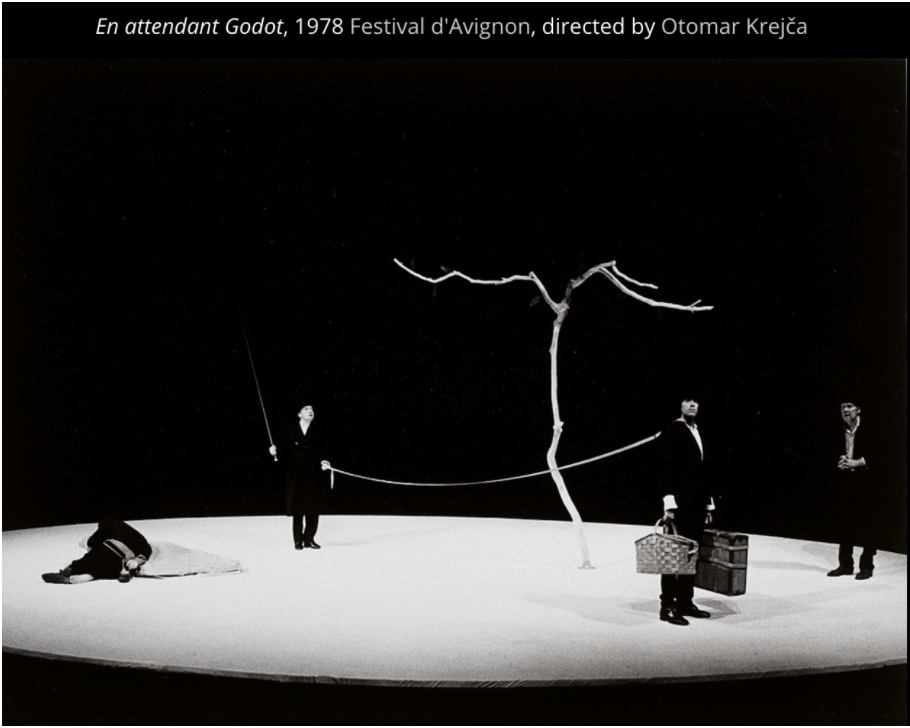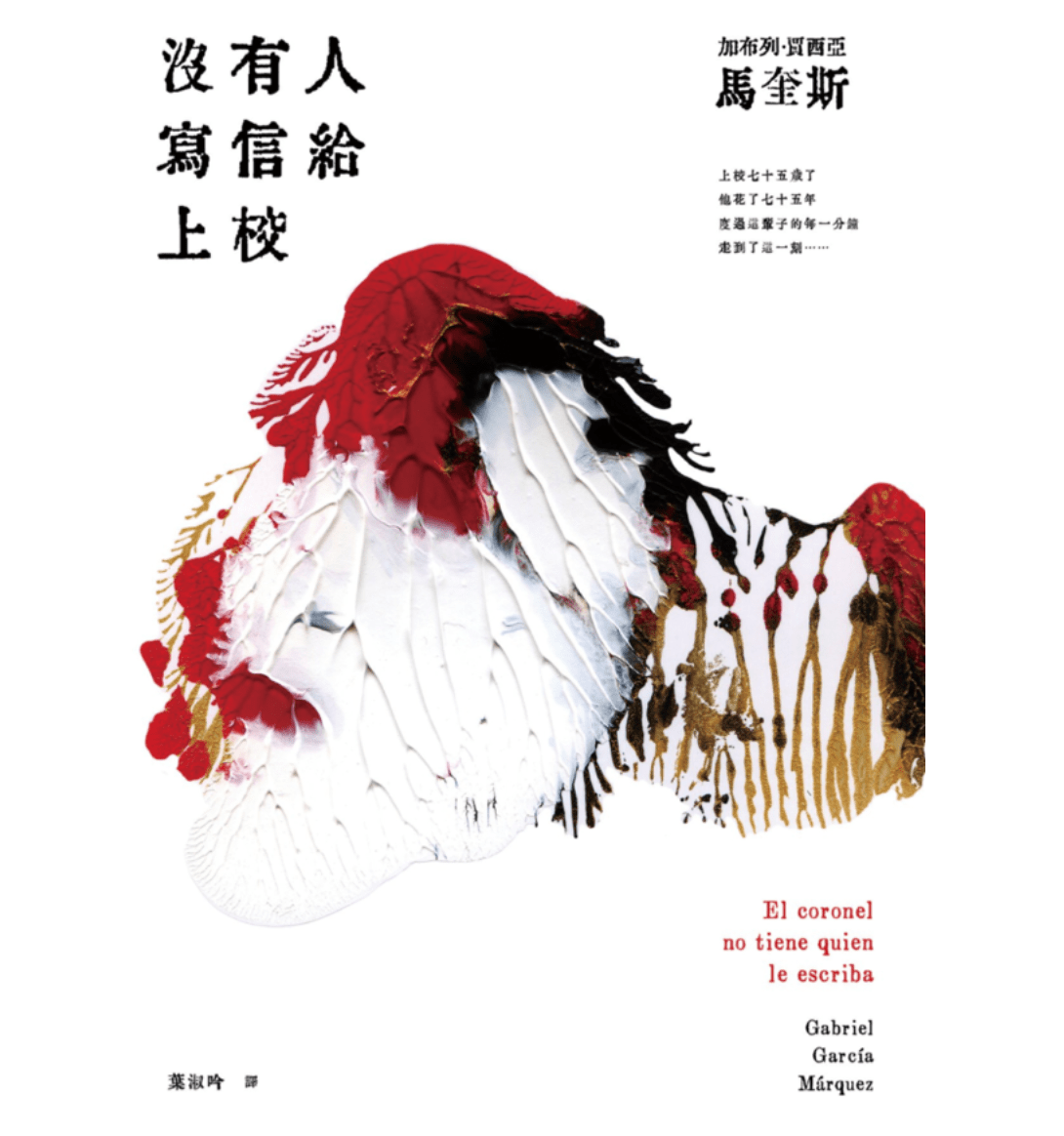"Satan's Tango" X "Waiting for Gotuo" X "No One Writes to the Colonel": Are we still "waiting" now?
Thanks to Weizhu Paratext for publishing this article
Link: http://paratext.hk/?p=2573
"Action is the beginning of success, waiting is the source of failure.", "Only action can bring about change.", "People have infinite possibilities, but if you don't act, nothing is possible."...
Waiting is often a negative word for people today. First, he is not efficient. And it usually means waste. Second, compared with action, waiting is often passive, which symbolizes that people cannot choose and control their own time. It is more likely to imply that he has no opinion or idea, and can only wait silently. It seems like the protagonist in Osamu Dazai's "Disqualification in the World" is a coward who fails, achieves nothing, and dares not do anything. I can't plan my life, I don't have a dream, and then I go with the flow and let others (time, fate) slaughter it. Blindly seek guidance in idols, "gods" and politicians and wait for their "salvation".

Laszlo's "Satan's Tango": When the wait is over
These feelings and thoughts about waiting are just beginning to face the Hungarian writer-Kalesna Hokai. The idea that we tend to come across when the characters appear in Laszlo's "Satan's Tango." In a way, the work feels a lot like an Orwellian political allegory at first. The people described in it are like the ignorant masses who are humble, empty-minded but unable to make changes, longing for a "savior" to save them in the distant future from the sea of misery full of nothingness. However, everyone knows that the person they have been waiting for and looking forward to is actually just a liar. Simply wanting to use their desperation to establish authority for themselves.
"They are slaves who have lost their masters, but they cannot live without pride, dignity and bravery. These things support their souls, even if they feel in the depths of their stupid brains that these qualities do not belong to them. , the reason why they are like this is that they like to live in their shadows..."
This is what Irimias, seen as the savior, said of those who would depend on him. He used ingenious words, put on a humble gesture, created pauses and raised voices in his speech at the right time, and further asked all kinds of questions that seemed philosophical and difficult to answer, to guide these people step by step into the imagination of a bright future. Forget the tragic past. As Laslow wrote in the article: "The 'picture of the future' will not only completely replace the past, but it will completely erase it." Further forming people's blind fanaticism.
But once we read further, we will find more and more that "Satan's Tango" is not simply a work born to expose and criticize political lies. Rather than metaphorizing the loss of reform, Laszlo wants to use this work to describe how people face their own loss after waiting and how to re-examine the impact of waiting on life from such loss. significance.
At that very moment, when Irimias appeared at the gate of the "Manor", his trust in him was shaken... Maybe, if he didn't come back, there was still a glimmer of hope...
Nietzsche once said, "What man fears is not suffering, but the meaninglessness of suffering." Here we can make the same sentence: "What man fears is not waiting, but the meaninglessness of waiting." Although he appeared according to his agreement with the people, at the same time he appeared, he also disappointed the character who had been looking forward to him the most in the book-Fortaki. Because he found that what he had been waiting for for a long time was not what he expected in the waiting. In this situation, he would even prefer to wait for something that will never appear, so that although the miracle he imagined will not happen, it can stay in his heart forever without being shattered, and comfort himself Continue to live well and "wait" well...
But we don't often ask: Is it meaningful to wait for something that will never appear, that doesn't actually exist at all?
I think most people probably don't think so. Even though most of us know that the so-called ideal is actually such a thing that will never appear and may not actually exist, most people will say that instead of waiting for an ideal to come, it is better to try to create it with actions, even if it is only created. The ideal simulacrum also makes more sense than waiting, doesn't it?
Perhaps for general philosophy, political thought or the concept of life value, people's pursuit of ideals should be like this. And "waiting" is not to be applauded. He is too passive, even a kind of ignorance. It seems that he is a deviant believer, believing that a god that does not exist will come to save him. But in literature, drama...the fields that are often called art, "waiting" seems to have a different meaning that we have forgotten or often overlooked today. Because compared with the guiding thoughts of philosophy, in the fictional world constructed by novels and theaters, we are more describing and facing the powerlessness of people and the cruelty and absurdity of fate.
The futility of waiting is the real theme behind Satan's Tango. This theme also reminds us of a very famous play in history - Samuel. "Waiting for Godo" by Beckett.
Beckett's "Waiting for Godo": When Waiting is Meaningless Talk to Oneself

"Waiting for Godo" and "Satan's Tango" are very similar, but simpler in structure and plot. There are only two "waiting" characters in it, namely Frodik and Asdogan. Similar to the character in "Satan's Tango". The way Dick and Ace first came on made us think they were not only funny, but also a little silly. They kept saying that they were waiting for a man called Gotuo, but they didn't know anything about Gothu except that this person could save them from their current misery. Just staying somewhere, sleeping in that stinky ditch, waiting day and night for that person called Gotho.
But what's most different from "Satan's Tango" is that "Godor" is not like Irimias, who doesn't appear until the end. While waiting, we see Dick and Ace repeating a lot of boring or possibly funny behaviors to pass the time (eg Ace couldn't take his boots off for a long time). Compared to "Satan's Tango", which is precise, dark, and long without paragraphs, the dialogue between Dick and Ace in "Waiting for Godo" often makes us feel that this is not a dialogue between two people, but more like a dialogue between two people. It's some kind of self-talk, back and forth answering each other. Sometimes it's funny, and sometimes it feels deeply lonely.
"All the sounds of death."
"They rattled like bird wings."
"Like leaves."
"Like sand."
"Like leaves."
(silence)
"Speak in unison."
"They're all talking to themselves."
Putting aside the form of the script, if you turn their dialogue into line-by-line text, the paragraph is literally like a poem. It even makes us feel that there is a kind of music flowing in the text.
Many people who watch "Waiting for Godo" for the first time may think that the waiting of the two is a way of drama to satirize some kind of ignorance, and it is so absurd to let the audience watch some "waiting". So absurd that we may not even know what we are waiting for and still keep "waiting". But on the other hand, Beckett has given another positive attitude to such "waiting": life is actually an absurd "waiting". In "waiting" we can see our own emptiness, but also in this endless "waiting", in order to pass the time, we have to play with ourselves and create something with others who are waiting with us , say something. Whether it is meaningful or meaningless, it all happens to face the waiting of "life".
Such waiting may be absurd, or it may be stupid. Maybe monotonous, maybe empty. Because it reflects that as long as people lose hope in life, they will fall into a long period of nothingness and emptiness. But when one seeks hope, one often finds that in order for it to happen, one has to go through all kinds of absurd waits.
Ironically, in waiting, the feeling of anticipation is the deepest and happiest. It is so profound that sometimes people want what they want to happen on the one hand, and on the other hand, they secretly hope that what they want to happen can be delayed later, because then he can expect more of what he expects. Once Gotho really appears like Irimias in "Satan's Tango", Dick and Ace may not know what else they can expect in life, because they can't do anything but obey Irimias. In the repeated daily life, I have more imagination and attempts to my original expectations.
Waiting does not necessarily mean boredom and nothingness, because any boredom and nothingness seem to be able to be transformed into new possibilities and new imaginations in the dull daily life because of waiting, but people must have the ability to endure and transform the absurd. This is another dark side of "Waiting for Godo" that we don't easily see.
Thinking about it from another angle, does waiting for Godo really mean waiting for death? Waiting for your own end? And, while waiting for death, keep escaping this waiting target?
This is the biggest difference between "Waiting for Gotuo" and our general idea of "waiting": "Waiting" in "Waiting for Gotuo" is waiting, but while waiting, they are also trying to escape from what they are waiting for. thing. In the play, if a person resembling Gotho did appear, they would refuse to admit that that person was the Gotuo they were waiting for.
Here, waiting is not for that final goal, but for the process of waiting itself. This is very different from the general people who yearn for a savior, because they always try to find a realistic person to represent their idols, so as to relieve the anxiety caused by waiting. But the waiting in "Waiting for Gotuo" is a constant continuation of this anxiety that can never be waited, denying the goal of waiting, but at the same time, it continues to linger there, unwilling to evacuate, giving up waiting.
If you think about it this way, the "waiting" in "Waiting for Gotuo" looks negative at first glance, but it is not a kind of giving up, but more like a kind of persistence. He insists that no matter how absurd, empty, and even cruel life is, there is still something worth waiting for. But leaving Beckett aside, we find that this point of view is fully and powerfully presented by Gabriel. Garcia. "No One Writes to the Colonel" by Marquez.
Marquis, "No One Writes to the Colonel": When Waiting is an Action

The three books "Satan's Tango", "Waiting for Godo", and "No One Writes to the Colonel" are all about waiting. But "Nobody Writes to the Colonel" despite some passages that feel magical or use metaphors. But it is the least absurd and the most realistic of the three books. The characters in it don't make us feel funny like "Satan" or "Godob," but they are full of deep, delicate minds.
"No one wrote to the colonel," the title immediately tells us that the colonel is waiting for a letter. The letter was about his pension and had a lot to do with his previous civil war. However, the promises made by the government have not been fulfilled. And the life of the colonel slowly gets into trouble as he gets older...
His comrades who were born and died in the past left him one by one, and his son lost his life in an accident due to cockfighting. Now the old Colonel has only a home where almost everything has been sold, except for the rooster left by his son before he died, and his old asthmatic partner, living a life without a meal.
At this moment, the only thing he can think of is to look forward to the letter from the pensioner to save his life and his wife's life. However, the wife had long held no expectations for that letter. He has been asking the husband to sell the fighting cock left by his son. But the colonel was reluctant, because the rooster was always associated with his nostalgia for his son. I even hope that I can win the cockfighting competition two months later to comfort my son's spirit in heaven.
But he tried a lot, every day running to the postman waiting for the ferry to deliver the letter, seeking the help of a lawyer. The only response I got was always the title of the book: "No one wrote to the colonel." In the second half of the book, the colonel seemed to be discouraged, and he decided to take the chicken out several times and plan to sell it. . However, at the last minute, he sullenly decided not to sell, opting to continue waiting for the pension letter he should have received. And his wife asked him in a collapsed way: If the letter didn't come, what would we eat? He was stunned for a while, and finally said only one sentence: "Eat shit." The whole work came to an abrupt end, as if to imply that some kind of end was coming. People are powerless, but they are unwilling to pretend to be ignorant, choosing to wait and resolutely face the fate that finally comes.
The reason why the colonel chose to wait at this time was not because of that letter, to be honest. It is to express the dissatisfaction that has accumulated over a long period of time through waiting itself. Stick to your position, no matter how sad and desolate the process is. This makes us forget: the "action" and "waiting" mentioned at the beginning are not necessarily completely opposites. Here, for the colonel, waiting is an action. It is a positive response in a helpless environment.
Interestingly, the Colonel is different from the characters in the previous two works who have always emphasized that he is waiting. At first, he was very afraid that others would know that he was waiting for that letter that could never be answered, so he always chose to lie and pretend he didn't care. As if waiting was a shame in itself. Only later did he express his right to wait and say no to reality with the courage of "eat shit".
"Waiting": Offerings to Nothingness
Maybe there is something in everyone's life that won't appear but you have always believed in and waited for? However, Laszlo, Beckett, and Marquis choose not to tell us whether what you "wait for" (hold on) is worth it in the end. Because for them, waiting is valuable not because the end result of waiting is good, but because in the process, people have to go through a long and meaningless process of how to face and transform waiting. And it is precisely because the more uncertain we are whether what we are waiting for will come true, the deeper and richer our experience and feelings will be. It just so happens that this is the opposite of today's deterministic technological development.
Japanese reasoning writer Natsuhiko Jinggoku once said when he commented on one of the four great mystery books in Japan, "The Offering to Nothingness": "After closing the book, the bondage that the writer gave us really started, and it has continued to this day." Although. It's a little disrespectful to misappropriate a writer's comment, but it seems like a good way to describe the state of mind we'll feel when we're done discussing these three books. On the one hand, perhaps "waiting" is an offering to nothingness and uncertainty, right? On the other hand, when we look at these three works together, we will find that they seem to ask a question that will bind us all our lives in the future: Compared with the past, are we more afraid of waiting than people in the past? More afraid that waiting is pointless? As long as we are more uncertain about the outcome, is it the less we dare to "wait"?
(Original post on Blog: Literary Lab)
Medium: https://medium.com/@f0921918962
Square: https://vocus.cc/1111/home
Like my work? Don't forget to support and clap, let me know that you are with me on the road of creation. Keep this enthusiasm together!

- Author
- More